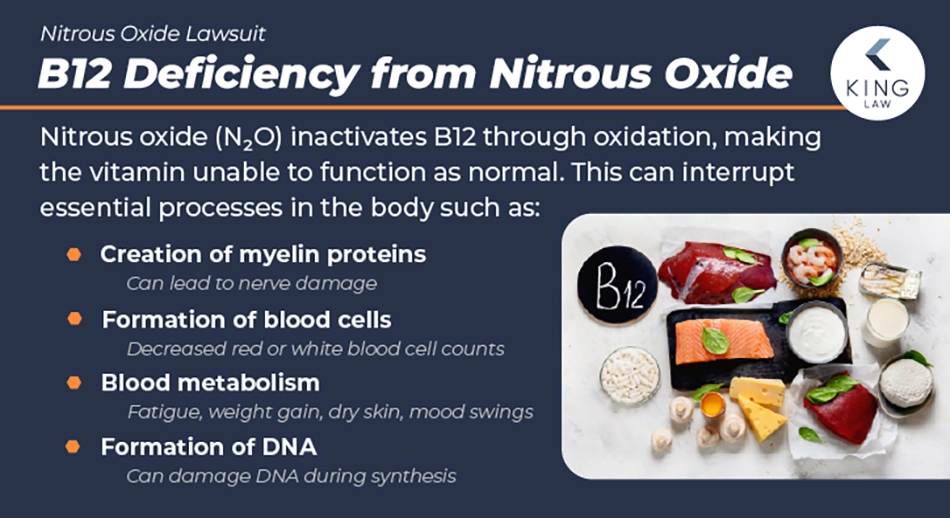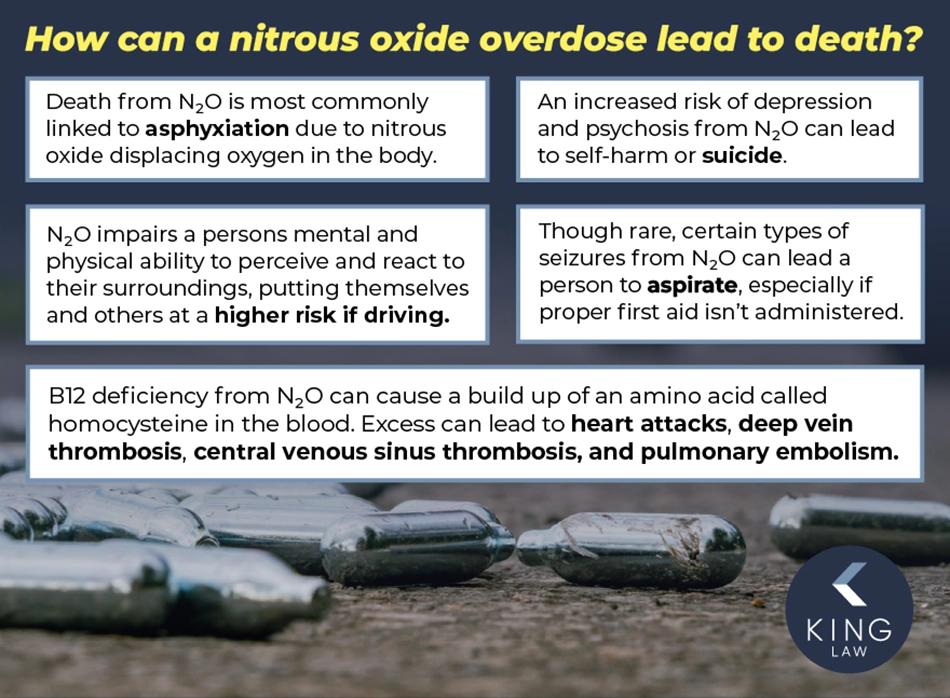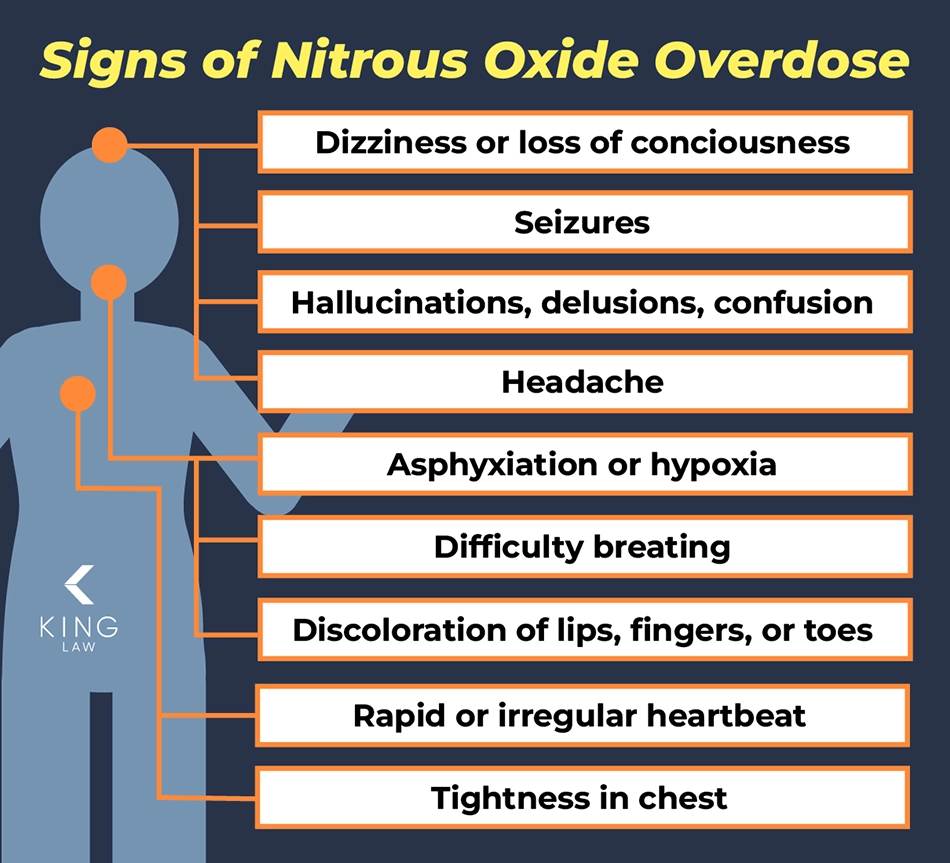Complete the form below to see if you qualify for a Whip-It Lawsuit

Recreational use of nitrous oxide can lead to serious problems. Nitrous oxide competes with oxygen in the bloodstream and can, over time, lead to nervous system degeneration. Heavy users can potentially suffer from the effects of nitrous oxide poisoning. If the overdose is sufficiently large, these effects can even be lethal.
Nitrous oxide poisoning may present with a number of physical and cognitive symptoms, including shortness of breath, seizures, rapid heartbeat, and even psychosis.
About Nitrous Oxide Poisoning and Overdose:
What is Nitrous Oxide Poisoning?
What Are the Symptoms of Nitrous Oxide Poisoning?
Can You Overdose on Nitrous Oxide?
Nitrous Oxide Overdose Symptoms
Diagnosing Nitrous Oxide Poisoning and Overdoses
Treatment for Nitrous Oxide Poisoning and Overdose
What is Nitrous Oxide Poisoning?
Nitrous oxide (N2O) poisoning occurs when someone inhales too much nitrous oxide and experiencing one or more negative side effects. Poisoning is most common in people who use nitrous oxide as a recreational drug. Poisoning, as defined by the Cleveland Clinic, is defined as exposure to a toxic substance that sickens or harms you. Although nitrous oxide can have therapeutic and anesthetic effects when properly mixed and administered under medical supervision, recreational N2O users are more likely to be exposed to poisonous amounts of the gas.
Nitrous oxide poisoning may refer to both acute and long-term symptoms of nitrous oxide inhalation. The short-term risks of nitrous oxide are typically the result of oxygen deprivation. The long-term side effects are often a result of vitamin B-12 deficiency. Some long-term symptoms, like abnormal blood cells, are a result of multiple factors.
What Are the Symptoms of Nitrous Oxide Poisoning?
Some nitrous oxide poisoning symptoms are easily observed. For example, people often become giddy, which has led to the drug’s nickname “laughing gas.” Other signs of nitrous oxide poisoning may be more subtle. Short-term, immediate symptoms of nitrous oxide poisoning include:
- Wheezing
- Coughing
- Eye or nasal passage irritation
- Chest tightness
- Discoloration of lips, fingers, or toes
- Hallucinations or delusions
- Loss of coordination or consciousness
- Frostbite on mouth or face
- Seizures
- Rapid heartbeat
- Blood pressure fluctuations
- Asphyxiation (in extreme cases)
Long-term Nitrous Oxide Poisoning
Although nitrous oxide presents potentially dangerous short-term risks, long-term and frequent use can lead to debilitating health conditions. Long-term side effects and symptoms of nitrous oxide poisoning include:
- Vitamin B-12 deficiency
- Spinal cord degeneration
- Brain damage
- Paralysis
- Megaloblastic anemia
- Fatigue
- Long-term psychosis
- Symptoms of schizophrenia
Nitrous Oxide Poisoning and Vitamin B-12
Many of the long-term effects of nitrous oxide poisoning are the result of vitamin B-12 deficiency. Nitrous oxide interacts with the vitamin (cobalamin) in the blood, inactivating it and rendering it unable to be absorbed. Vitamin B-12 is crucial for maintaining the protective myelin sheaths of the nervous system. Over time, weakened sheaths can cause the degeneration of the nervous system, leading to paralysis and cognitive impairment.
Vitamin B-12 is also important in DNA synthesis. Megaloblastic anemia, a condition in which the body produces abnormally large and less-effective infant red blood cells, can be another long-term symptom of nitrous oxide poisoning.

Can You Overdose on Nitrous Oxide?
It is possible to overdose on nitrous oxide. An overdose is a toxic dose of a drug, typically in excess of recommended amounts. Many people who use recreational nitrous oxide use it in large amounts. This is because the gas is relatively inexpensive and available in consumer-oriented flavors. Additionally, it is readily available in large quantities. For example, tanks are available in high-volume sizes, exceeding 3 liters. These compressed charges potentially offer hundreds of doses in easy-to-use canisters. Rapid use within a short period increases the risk of accidents or asphyxiation, while long-term use raises the risk of persistent health conditions.
How Much N2O Does it Take to Overdose?
The amount of N2O necessary to produce an overdose can vary by individual, and the issue is confounded by the fact that medical doses are mixed 50/50 with oxygen. Recreational N2O tends to be nearly pure nitrous oxide. Additionally, the risk of overdose increases with consecutive “hits” and frequent usage. People who combine nitrous oxide with other drugs like alcohol, marijuana, stimulants, or depressants may be at a greater risk of overdosing.
Nitrous Oxide Overdose and Death
Nitrous oxide overdoses can potentially cause death in several ways. The most immediate risk of death comes from asphyxiation (lack of oxygen to the brain), because nitrous oxide displaces oxygen in the lungs. People high on nitrous oxide are also at risk of accidental death from falling or crashing a motor vehicle. People high on nitrous may be a risk to those around them and cause vehicular deaths. People who operate motor vehicles while using nitrous oxide raise the risk of death for nearby individuals. There have been several instances of people using N2O while driving and hitting and killing pedestrians.
Less commonly, nitrous oxide can cause heart attacks and result in conditions with potentially fatal outcomes. Nitrous oxide use can also lead to conditions like deep vein thrombosis, pulmonary embolism, and central venous sinus thrombosis, all of which can be life-threatening. Depression risks associated with N2O usage and addiction may also have an elevated risk of suicide.

How Common are Nitrous Oxide Overdose Deaths?
While it’s not particularly common, researchers and medical professionals are concerned with the growing number of nitrous oxide overdose events. Among the 192 N2O-related emergency medical services responses tracked in a 2019-2023 Michigan study, 14 (7.3%) were fatalities. The exact cause of death could not be determined from the data, and many of the deceased had multiple substances in their blood. Nitrous oxide is often used along with other recreational drugs.
Nitrous Oxide Overdose Symptoms
Nitrous oxide overdose symptoms can come on quickly. If these symptoms are noticed, it is important to stop inhaling the gas and seek medical assistance. The acute effects of nitrous oxide are felt quickly after inhalation and typically only last for a few minutes, which often leads to consecutive use of the inhalants.
First Signs of a Nitrous Oxide Overdose
Early signs of nitrous oxide overdose may include:
- Asphyxia or hypoxia (lack of oxygen)
- Headache
- Dizziness
- Confusion
- Loss of consciousness
- Irregular heart rate
- Seizures
- Difficulty breathing (shallow or not breathing at all)
- Skin color changes (bluish to gray depending on complexion), typically the lips or fingernails

Diagnosing Nitrous Oxide Poisoning and Overdoses
Methods of diagnosing nitrous oxide poisoning may vary depending on the symptoms and point of contact with the medical system. People may interact with a poison center, call emergency services, go to an emergency room, or visit their doctor. People may diagnose themselves of N2O poisoning after experiencing symptoms or witnessing symptoms in a friend or family member. People who have immediate symptoms like asphyxia, seizures, or confusion may be experiencing nitrous oxide poisoning.
Long-term usage may present with loss of sensation in the extremities, paralysis, or anemia. Tests like MRIs, nerve conduction studies, and blood panels may detect neurological damage, vitamin B-12 deficiencies, or anemia.
MRIs to Diagnose Damage from Nitrous Oxide
MRIs can be used to detect damage to myelin sheaths. This is particularly useful in cases where N2O users present with neurological symptoms like tingling in the extremities, but still have normal B-12 levels. If you are experiencing pins and needles or loss of feeling in your body after nitrous oxide use, you should discuss your symptoms with a physician immediately.
Who Is at Risk of Nitrous Oxide Poisoning and Overdose?
Anyone who uses nitrous oxide recreationally is potentially at risk of an overdose. Though the risk of poisoning increases with consecutive hits and long-term usage, even a first-time user may accidentally inhale more than they intended, or have an underlying condition that makes them more susceptible to side effects. Additionally, individuals who inhale N2O while also taking other drugs may have a harder time regulating how much laughing gas they huff. This can lead to unintended poisoning or overdoses.
Treatment for Nitrous Oxide Poisoning and Overdose
Nitrous oxide poisoning treatments vary depending on the symptoms an individual presents with. However, in all cases, stopping usage is critical. This may require counseling and psychiatric support. Users with vitamin B-12 deficiencies may require supplementation. Hypoxic individuals may need oxygen supplementation. Those who have suffered partial paralysis or loss of motor control may require extensive physical therapy.
Recovery from Nitrous Oxide Poisoning and Overdose
It is possible to recover from nitrous oxide poisoning, especially if it’s caught early. Full disclosure of your symptoms and nitrous oxide usage to the following resources will improve your chances of getting the help you need:
- 911: for immediate emergency intervention
- Poison Help Centers
- Addiction medicine specialists
- Drug recovery programs
What Should I Do If I Think I Have Nitrous Oxide Poisoning?
Nitrous oxide is not physically addictive in the way that opioids or alcohol can be, so ceasing usage is a good idea if you can. However, you can become psychologically addicted to the gas, making cessation difficult. If you experience signs of poisoning or witness signs of acute poisoning in a friend or family member, you should contact emergency services immediately. If you have long-term symptoms you suspect may be linked to N2O, consulting with your physician, therapist, or a drug treatment center can help you get access to relevant treatments.
What Should I Do if I Think Someone has Overdosed on Nitrous Oxide?
If someone near you appears to have overdosed on nitrous oxide, watch for the symptoms listed above and contact emergency services or a medical professional and follow their instructions. While you are waiting for responders, do what you can to make sure the individual does not fall or injure themselves, and prevent them from driving or operating heavy machinery. Discourage them from inhaling more N2O if possible.
Legal Options for People With Nitrous Oxide Poisoning
The recent increases in nitrous oxide poisoning are conspicuous. In recent years, nitrous oxide companies have rolled out flavored gas brands like Galaxy Gas, Whip-Its!, and Baking Bad. While being sold as whipped cream aerators, their branding and design evoke recreational N2O usage without adequately disclosing the risks. Further, their distribution tactics include non-culinary outlets like gas stations, headshops, and smoke shops.
Individuals harmed by these products, or their next of kin, may be eligible to file a lawsuit against nitrous oxide manufacturers. This includes joining a class action lawsuit or filing an individual personal injury or wrongful death suit.
Legal Options for Family Members Who Lost a Loved One to Nitrous Oxide Overdose
Family members who have lost a loved one to a nitrous oxide-related incident may be eligible to file a wrongful death suit against nitrous oxide companies. Family members can seek compensation for past expenses, end-of-life care and costs, and pain and suffering.
Compassionate Legal Support With King Law
King Law offers free case evaluations for individuals who have been injured by nitrous oxide, and for family members of people who lost loved ones to N2O. Our legal team has experience holding companies responsible for taking advantage of people. We can help you work toward getting compensation and justice for your injuries.

